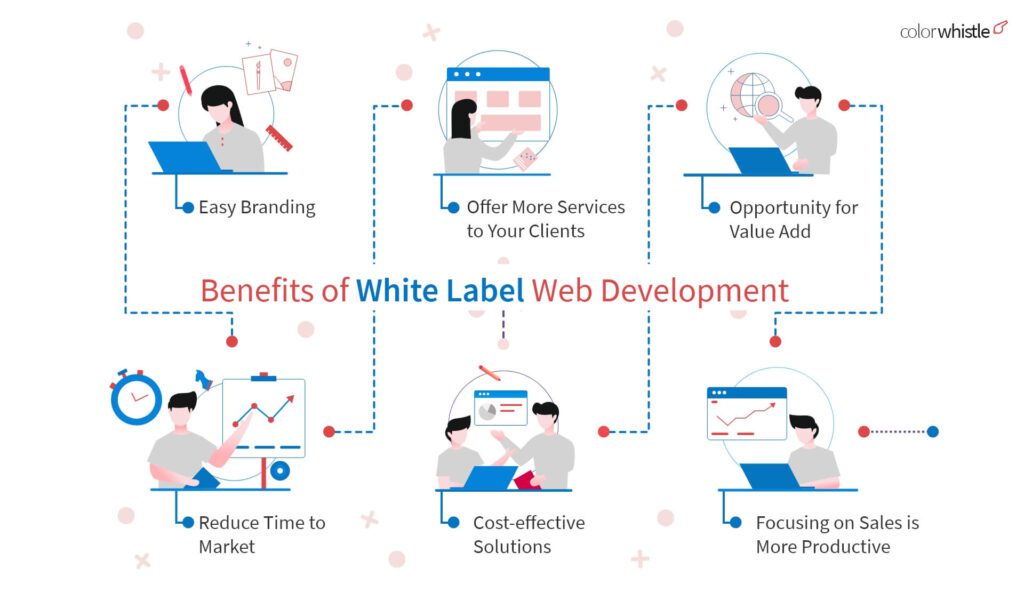Branding White Label Web Development Services: A Comprehensive Guide

Branding White Label Web Development Services: A Comprehensive Guide
Estimated reading time: 10 minutes
Key Takeaways
- White label web development allows agencies to extend their service offerings without building in-house teams.
- Effective branding builds trust and credibility in a competitive market.
- Strategic promotional practices and exceptional portfolios validate technical competence.
- Robust case studies and testimonials serve as persuasive social proof.
- Partnerships and emerging technologies drive long-term growth and innovation.
Table of Contents
- Introduction
- Overview of White Label Web Development
- The Importance of Effective Branding in White Label Services
- Branding White Label Web Development Services
- Promoting White Label Offerings to Clients
- Creating Portfolios with White Label Projects
- Case Studies of Successful White Label Implementations
- Showcasing Testimonials for White Label Web Development
- Integrating Branding into Every Stage of the Client Journey
- Strategic Marketing Considerations for White Label Providers
- Conclusion and Future Outlook
- The Role of Strategic Partnerships in the Success of White Label Services
- Best Practices for Communication and Collaboration in White Label Projects
- Tailoring Pricing and Payment Models for White Label Web Development
- The Impact of Emerging Technologies on White Label Web Development
- Enhancing User Experience and Interface Design in White Label Projects
- Quality Assurance and Continuous Improvement Practices
- Leveraging Analytics and SEO for White Label Web Solutions
- Overcoming Challenges in Scaling White Label Web Development
- Training and Skill Development for Consistent Quality in White Label Services
- Future Trends and Strategic Planning for White Label Innovations
- Final Thoughts
- Frequently Asked Questions
White label web development is a service model where a provider builds websites or web applications that digital agencies can rebrand as their own. In today’s competitive market, effective branding of these services is essential. This model allows agencies to expand their service offerings without the overhead of maintaining internal technical teams, ensuring quality, consistency, and efficiency. As you continue reading, you will uncover strategies to promote white label offerings, construct compelling portfolios, and leverage detailed case studies and testimonials to instill trust with prospective clients.
White label web development is a model in which one company designs and builds websites or applications for another company to rebrand. This approach helps digital agencies address diverse client needs while capitalizing on the technical expertise of specialized development partners. For further details on this model, visit this resource and for insights on future trends, see this article as well as this service overview. Additionally, a comprehensive guide is available at Hire Web Creators.
Effective branding in white label services establishes a professional identity that reassures digital agencies of consistent high quality. A strong brand reputation, underpinned by testimonials, case studies, and robust portfolios, signals reliability and trustworthiness. As detailed by HTML Burger, a well-branded service enhances client retention and acquisition, making it a formidable competitive advantage.
Branding your white label web development services involves presenting a clear value proposition that distinguishes your technical and creative strengths. Highlight core capabilities—whether they are advanced integrations, custom applications, or e-commerce solutions—and support your claims with tangible case studies and client testimonials. For further validation, refer to sources such as HTML Burger and Unicrew.
Successful promotion of white label offerings relies on strategic messaging that communicates technical expertise and tangible benefits. Marketing tools—from brochures to digital campaigns—should emphasize how partnering with a trusted white label provider enhances an agency’s service portfolio. Additional insights can be found in our guide on selecting a partner at Hire Web Creators and HTML Burger.
A well-curated portfolio featuring detailed case studies and before-and-after project metrics helps demonstrate your technical capabilities and commitment to confidentiality. By focusing on concrete outcomes rather than proprietary details, your portfolio builds credibility with potential partners. For more guidance, refer to the comprehensive portfolio creation guide at Hire Web Creators.
Case studies of successful white label implementations provide concrete proof that your service model works. They detail the challenges, methodologies, and results achieved throughout the project lifecycle. This transparency, as showcased on HTML Burger, reassures agencies of your capability to deliver quality outcomes.
Showcasing testimonials from satisfied clients reinforces trust and provides social proof of your outstanding technical expertise. Genuine feedback not only highlights your reliability but also underscores your commitment to high-quality deliverables, as discussed on HTML Burger.
Integrating branding into every phase of the client journey—from onboarding to post-project follow-up—helps create a consistent and professional experience. Every touchpoint should mirror your core values and technical excellence, reinforcing your reputation as a reliable partner. Insights on maintaining consistency can be explored further at Unicrew.
Strategic marketing for white label providers involves a multi-channel approach, including content marketing, webinars, and digital advertising, to showcase your technical proficiency. Detailed guides at Unicrew and Hire Web Creators offer comprehensive strategies to boost market presence.
In conclusion, branding white label web development services is key to establishing trust, showcasing expertise, and driving agency growth. By leveraging comprehensive portfolios, detailed case studies, and strategic promotional tactics, your services can achieve long-lasting success. Stay ahead of market trends and continuously refine your approach to maintain excellence.
The Role of Strategic Partnerships in the Success of White Label Services
This section explores how forging robust strategic partnerships plays a critical role in the success of white label web development initiatives. In today’s dynamic digital environment, collaboration is the foundation of sustained growth. Strategic partnerships provide numerous benefits: they enhance service capabilities without requiring significant internal investments, expand market reach, and integrate complementary expertise. For deeper insights on successful partnerships, please refer to HTML Burger and Unicrew.
These alliances not only improve efficiency but also foster innovative problem-solving methods. With strategic partnerships, digital agencies witness accelerated growth and enhanced market recognition. This mutual collaboration underlines the importance of a trusted network and continuous innovation.
Best Practices for Communication and Collaboration in White Label Projects
Effective collaboration and clear communication are cornerstones of successful white label projects. Regular status meetings, defined milestones, and shared project management tools such as Slack or Trello ensure that all parties remain aligned. For further reading on these best practices, explore The White Label Agency.
Documenting every stage of the process—from initial discovery to final delivery—not only provides continuity but also assures the agency of systematic quality control. Establishing clear protocols creates transparency and fosters a dependable partnership.
Tailoring Pricing and Payment Models for White Label Web Development
Aligning pricing and payment models with the distinct demands of white label web development ensures profitability and robust partnerships. Flexible models, whether tiered pricing, flat fees, or custom quotes, reflect the added technical value provided. Detailed breakdowns of development costs and quality assurance processes build credibility with agency partners.
For a deeper understanding of strategic pricing, refer to expert insights available at Unicrew and HTML Burger. Open dialogue around pricing fosters mutual trust and sets clear financial expectations.
The Impact of Emerging Technologies on White Label Web Development
Emerging technologies such as headless CMS, Progressive Web Applications (PWAs), artificial intelligence, and cloud-based platforms are transforming white label web development. Integrating these technologies optimizes workflows and elevates service quality, allowing agency partners to offer cutting-edge, rebrandable solutions.
Staying abreast of these developments, as discussed on IceCube Digital and Unicrew, is critical for providers aiming to remain competitive and innovative in the digital landscape.
Enhancing User Experience and Interface Design in White Label Projects
In white label projects, a focus on user experience (UX) and interface design distinguishes the final product. Detailed research, usability testing, and iterative design processes ensure that the solution is as engaging as it is functional. For platform-specific design guidelines, visit Hire Web Creators.
Collaboration between technical and design teams, along with continuous feedback sessions, helps align the user interface with the digital agency’s rebranding needs—resulting in a seamless end-user experience.
Quality Assurance and Continuous Improvement Practices
Robust quality assurance processes, including automated testing and manual reviews, guarantee that every project meets high standards. Regular performance monitoring, code reviews, and client feedback sessions contribute to continuous improvement. Guidance on these methodologies can be found at Unicrew and HTML Burger.
Embedding continuous feedback into your workflow ensures that every project becomes an opportunity for process enhancement, fostering long-term excellence and reliability.
Leveraging Analytics and SEO for White Label Web Solutions
Integrating detailed analytics and robust SEO strategies not only enhances website performance but also provides measurable value to agency partners. Tools like Google Analytics, SEMrush, and Moz enable providers to deliver data-driven improvements.
Following SEO best practices—such as keyword optimization and meta tagging—ensures greater organic reach. For more information, refer to insights found on HTML Burger.
Overcoming Challenges in Scaling White Label Web Development
Scaling white label projects involves standardizing processes, employing automation tools, and ensuring consistent communication across teams. Addressing technological gaps and adhering to strict quality protocols are key to managing increased project volumes. Detailed scaling strategies can be reviewed at Hire Web Creators and Unicrew.
By balancing innovation with standardization, providers can confidently meet increased demand while maintaining high-quality standards.
Training and Skill Development for Consistent Quality in White Label Services
Continual training and skill development are crucial to ensuring the delivery of top-tier white label services. Regular technical workshops, online courses, and internal mentoring programs help teams stay updated on new technologies and methodologies.
Investing in professional development not only enhances productivity but also strengthens your reputation. For further insights, consult resources like HTML Burger and Unicrew.
Future Trends and Strategic Planning for White Label Innovations
Anticipating future trends such as AI, machine learning, augmented reality, and mobile-first development is essential for staying competitive. Strategic planning that aligns internal capabilities with market innovations prepares your services for ongoing evolution.
Engaging in regular strategic reviews and investing in research and development—as detailed on IceCube Digital—ensures that your offerings remain cutting-edge and relevant.
Final Thoughts
The journey to mastering branding white label web development services requires dedication, strategic planning, and continuous evolution. Every element—from initial outreach to final delivery—plays a vital role in building lasting partnerships and achieving market leadership. Embrace emerging technologies, nurture strategic partnerships, and focus on continuous improvement to position your brand as a leader in the digital agency landscape.
Explore additional resources and guides on our website to further enhance your strategic approach and propel your business forward.
Frequently Asked Questions
- How do white label services benefit digital agencies?
They allow agencies to expand their service capabilities without investing in in-house technical teams, ensuring quality and scalability.
- What should be included in a white label service portfolio?
A well-curated portfolio should feature case studies, measurable outcomes, client testimonials, and before-and-after project visuals.
- How can pricing models be tailored for white label projects?
Pricing models may include tiered options, flat fees, milestone-based payments, or custom quotes that reflect the project’s complexity.
- What emerging technologies are impacting white label development?
Technologies such as headless CMS, PWAs, AI, and cloud platforms are significantly enhancing development workflows and overall service quality.
- Why is continuous training important in white label services?
Continuous training ensures teams are updated with the latest technologies and best practices, promoting consistent quality and innovation.
